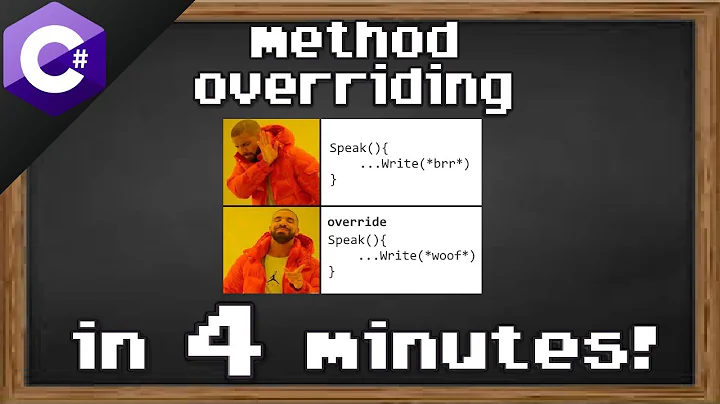Requiring virtual function overrides to use override keyword
Solution 1
Looks like the GCC 5.1 release added exactly the warning I was looking for:
-Wsuggest-override
Warn about overriding virtual functions that are not marked with the override keyword.
Compiling with -Wsuggest-override -Werror=suggest-override would then enforce that all overrides use override.
Solution 2
There are two things you can do.
First, Clang 3.5 and higher have a -Winconsistent-missing-override warning (triggered by -Wall). This does not quite work for your example, but only if you would add a void foo() override {} to class B and not in class C. What you actually want is -Wmissing-override, to locate all missing override, not just the inconsistently missing ones. That is currently not provided, but you might complain on the Clang mailinglist and they might add it.
Second, you use Howard Hinnant's trick to temporarily add final to the base class member function and recompile. The compiler will then locate all further derived classes that attempt to override the virtual base member function. You can then fix the missing ones. It's a bit more work and requires frequent rechecking when your class hierarchy expands.
Solution 3
The problem I see with -Werror=suggest-override is that it does not allow you to write the following:
void f() final {...}
Even though there is an implicit override here. The -Werror=suggest-override does not ignore this (like it should, since the override is redundant in this case)
But it is more complicated than that... If you write
virtual void f() final {...}
It means a completely different thing than
virtual void f() override final {...}
The first case does not need to override anything! The second does.
So I am assuming the GCC check is implemented this way (i.e. to sometimes accept the redundant override) in order to get the last case right. But this does not play well e.g. with clang-tidy, which will correctly remove the override when final is sufficient (but then GCC compilation will fail...)
Related videos on Youtube
Barry
I like c++. I am also somewhat obsessed with SO. Users I subscribe to, in no particular order: Jonathan Wakely, T.C., Columbo, Yakk, dyp Various badge milestones: 1st to receive the gold C++20 badge 1st to receive the gold C++17 badge 2nd to receive the gold language-lawyer badge 2nd to receive the gold C++14 badge 4th to receive the silver C++14 badge 8th to receive the gold templates badge 11th to receive the bronze C++14 badge 29th to receive the gold C++11 badge 31st to receive the silver templates badge 256th to receive the gold C++ badge, or 0x0100th if you prefer
Updated on July 09, 2022Comments
-
 Barry almost 2 years
Barry almost 2 yearsC++11 added
overrideto ensure that member functions you write that you intend to override base-class virtual functions actually do (or won't compile).But in a large object hierarchy, sometimes you could accidentally end up writing a member function that overrides a base-class virtual when you didn't intend it! For instance:
struct A { virtual void foo() { } // because obviously every class has foo(). }; struct B : A { ... }; class C : B { private: void foo() { // was intended to be a private function local to C // not intended to override A::foo(), but now does } };Is there some compiler flag/extension that would at least issue a warning on
C::foo? For readability and correctness, I just would like to enforce that all overrides useoverride.-
MSalters over 9 yearsIn reality, your function will be named
GazimpleWidget(Widget& w)and obviouslyC::GazimpleWidget(Widget& w)still gazimples widgets. You only get such problems when you try to abbreviateC::GazimpleWidget( )toC::GW( ). Don't do that. -
Anton Savin over 9 years
-
 Barry over 9 years@MSalters I do not understand the comment.
Barry over 9 years@MSalters I do not understand the comment. -
MSalters over 9 years@Barry: The problem with your simplified example is that
foois misleading. Real functions with real names are far less likely to collide unintentionally. If they are named the same, they should be doing the same and then overriding is probably not an error. -
 Barry over 9 years@MSalters "less likely...", "should be...", "probably not...". Yes, obviously. The entire point of the question is that the unlikely case happened, the function was incorrectly implemented, and I would like to verify this at compile-time.
Barry over 9 years@MSalters "less likely...", "should be...", "probably not...". Yes, obviously. The entire point of the question is that the unlikely case happened, the function was incorrectly implemented, and I would like to verify this at compile-time.
-
-
Marco Freudenberger over 6 yearsThe question was about how to enable a compiler warning when an the "override" keyword was not used on an overridden method, not how to enbale warnings on missusage of the override keyword.
-
 Chris Uzdavinis almost 6 yearsI agree with you. However, if we follow the advice to only use the "virtual" keyword on functions when first introducing a new virtual function, the issue you show where a final function may-or-may-not-override goes away. (This disallows code that introduces a virtual function and implements it as final, which seems nonsensical anyway.) Then the meaning is clear: "virtual" = new non-overriding virtual function, while "override" or "final" both indicate they are overrides (and do NOT have "virtual") and both should satisfy the g++ warning (but unfortunately doesn't.)
Chris Uzdavinis almost 6 yearsI agree with you. However, if we follow the advice to only use the "virtual" keyword on functions when first introducing a new virtual function, the issue you show where a final function may-or-may-not-override goes away. (This disallows code that introduces a virtual function and implements it as final, which seems nonsensical anyway.) Then the meaning is clear: "virtual" = new non-overriding virtual function, while "override" or "final" both indicate they are overrides (and do NOT have "virtual") and both should satisfy the g++ warning (but unfortunately doesn't.) -
underscore_d about 5 yearsDeclaring and finalising a base virtual function in the same breath, thus defeating the point of it being virtual, seems totally pointless. I'd almost say the language should disallow this, then compilers wouldn't have to ponder the philosophy of it.
-
Robert Skinner over 4 yearsI agree with @underscore_d and Scott Meyers on this one. If there is only one way to implement f(), take a firm stand and declare it non-virtual.
-
VainMan over 2 yearsThey removed this option from their docs for GCC 10.3 and later versions. The option still works on those versions though.
-
 Barry over 2 years@VainMan Half the warnings are in Dialect Options for some reason, it's very confusing.
Barry over 2 years@VainMan Half the warnings are in Dialect Options for some reason, it's very confusing.







